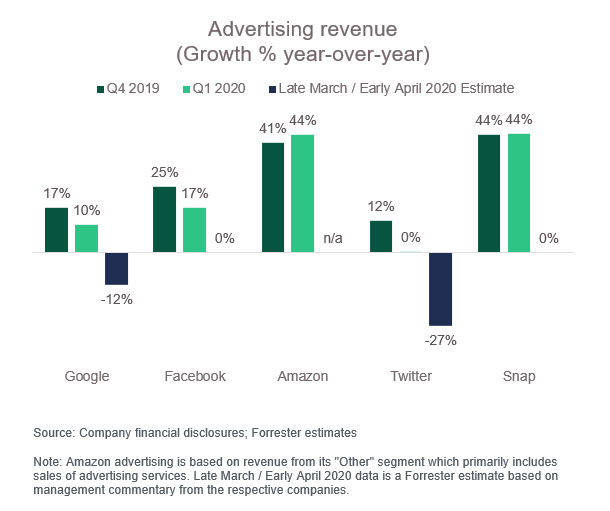Q1 Earnings: Google, Amazon, Facebook, Twitter, Snapchat Advertising Decelerates While Usage Accelerates
The global economy is in recession: US Q1 GDP declined 4.8%, and the eurozone’s contraction set a record. As far as the advertising triopoly and the social networks are concerned, however, advertising in Q1 surpassed bleak expectations and usage is booming — but not all is how it appears to be.
Advertisers: The Pandemic’s True Impact On Advertising Won’t Be Felt Until Q2
On paper, Q1 looked good for the advertising behemoths. With the bulk of revenue coming from advertising, Google saw a 10.4% year-over-year revenue increase, with Facebook +17%, Twitter +0.4%, Snap +44%, and Amazon +44%. But decent Q1 results masked significant declines at the end of March and leading into April, when the US stay-at-home orders took hold (see figure below). Since late March, all companies except Amazon are reporting revenue growth rates that equate to a revenue reduction of 20–30% from what they would have otherwise been.

When the pandemic’s full impact on advertising surfaces in Q2, the results will be uneven. We see this playing out in three ways:
- Ad revenue will decline for all except Amazon. Overall advertising demand and pricing of ads are down. But brands selling on eCommerce websites and marketplaces such as Amazon will continue to maintain or even grow ad spend to capture shopper demand during and post-pandemic. Twenty-three percent of Millennials and 22% of Gen Xers plan to shop more online in the future because of the pandemic (source: Forrester Analytics Consumer Technographics® COVID-19 Survey (Wave 1)).
- It will take longer for these ad behemoths to recover than anticipated. Forrester forecasts that US digital advertising spend could decline by as much as 18% year over year in 2020 under a more pessimistic scenario in which the economy does not recover until Q2 2021.
- Growth will come from countercyclical brands. As the recession wears on, companies that typically flourish during economic downturns, such as affordable consumer goods, alcohol, fast food chains, and utilities, will weather the recession and grow ad budgets quicker than cyclical brands in industries like travel, hospitality, and luxury. Currently, mid-pandemic, gaming, tech, and eCommerce are growing or stable while auto and travel/hospitality decline. Expect the Google, Facebook, and Amazon triopoly to fight for this growth in ad dollars.
Consumers: Unsurprisingly, Social Media, Search, And Online Shopping Activity Is Up, But Not All Of This Activity Will Sustain Post-Pandemic
Stuck inside and looking for entertainment and connection to others, people are online more. Facebook in particular is looking to capitalize and keep users engaged within its family of apps by launching new features like videoconferencing, a gaming app, and virtual dating — to name a few. And consumers are shopping online more: Amazon’s online sales surged 25% in Q1 2020 versus Q1 2019.
For marketers, increased usage won’t sustain after the pandemic, so don’t expect greater advertising reach. The spike in usage may not even be good for business. Sixty-four percent of consumers don’t trust the information they read about the COVID-19 pandemic on social media (source: Forrester Analytics Consumer Technographics COVID-19 Survey (Wave 1)), a continued erosion in consumer trust that we’ve tracked since the Facebook-Cambridge Analytica scandal. And Google admitted that despite growth in searches on its platform, the company is concerned about whether incremental searches are monetizable when people are searching more for COVID-19 symptoms than for the latest iPhone.
What It Means: Don’t Stop Marketing
Though record-high usage won’t continue post-pandemic, consumers are engaged across Google, Amazon, Facebook, Twitter, and Snapchat. Marketers that are able to maintain baseline levels of marketing activity will come out stronger. In fact, in every recession since the Great Depression, brands that maintained or increased marketing spend during a downturn saw higher sales during and after the recession.
